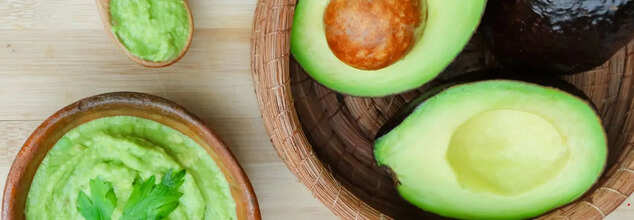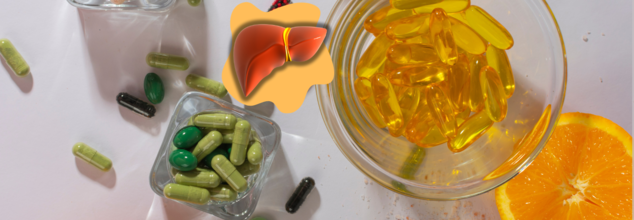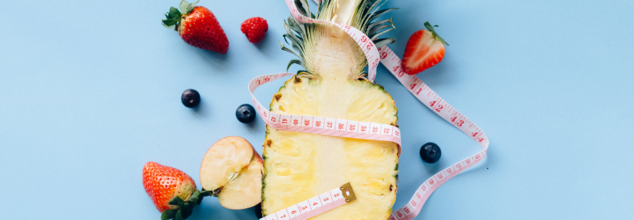- Health Conditions A-Z
- Health & Wellness
- Nutrition
- Fitness
- Health News
- Ayurveda
- Videos
- Medicine A-Z
- Parenting
- Web Stories

Avocado (Credit: Canva)
Avocados Are A Superfood—But Do You Know How to Store Them Properly?
Knowing how to store avocados can make all the difference in whether or not you can enjoy them. They are a notoriously fickle fruit—one second, they seem like they're days away from being ripe enough to enjoy, and the next second you're left with an overripe mess. While ultra-nutritious, the unpredictability of this fruit can result in food waste.
Why Do Avocados Turn Brown?
Avocado browning occurs when the fruit's natural enzymes are exposed to oxygen in the air, triggering a chemical reaction called enzyme polyphenol oxidase. Although the discolouration might look unappetizing, it doesn't make the avocado unsafe to eat. Contrary to popular belief, leaving the pit in an avocado won’t prevent browning. The flesh directly under the pit remains green simply because it isn’t exposed to air, not because the pit has any anti-oxidizing properties.
Storing Whole Avocados
Unripe Avocados
For unripe avocados, store them on your countertop away from other fruits and vegetables. This helps avoid exposure to ethylene gas from produce like bananas, which speeds up ripening. Check daily, as unripe avocados generally take four to five days to mature. An avocado is ripe when it yields slightly to light pressure and has dark green to black, bumpy skin.
Ripe Avocados
To prolong the life of ripe avocados, place them in the refrigerator. Store them in an airtight container or in the crisper drawer, but be cautious if they’re near ethylene-producing fruits like apples. Depending on ripeness, they can stay fresh for several days.
Storing Cut Avocados
Halved Avocados
To store a halved avocado, leave the pit and skin intact. Rub olive oil or lime juice on the exposed flesh, wrap it tightly in plastic wrap, and refrigerate. This method slows oxidation, keeping the fruit fresh for about two days.
Sliced Avocados
For sliced avocado, use a food storage container covered with plastic wrap pressed directly against the flesh to prevent air pockets. Lime or lemon juice can add a layer of protection but may alter the flavour. Due to the exposed surface area, sliced avocado is more prone to browning, making it harder to store for extended periods.
Storing Guacamole (mashed avocadoes)
To store guacamole, place it in a bowl, cover it tightly with plastic wrap so that it touches the surface of the guacamole, and refrigerate. Adding lime juice is optional but may help slow oxidation. Although the top layer may be brown, it can easily be scraped off before serving.
Why Should You Eat Avocadoes?
Avocadoes are a known superfood packed with antioxidants and nutrients that improve blood pressure management, eye health and energy production. While their creamy texture and nutty flavour make them a world favourite, they are packed with folate, magnesium, Vitamin B, Potassium and Copper. This makes them a perfect fruit for digestion and metabolism boost. Incorporating avocado into your morning meal can give you a sustained energy boost. Adding avocados to your diet can improve heart health.
Avocadoes are a great source of lutein and zeaxanthin, two carotenoids that protect against oxidative damage to eye cells. Avocados may improve mental well-being by combating depression. If you're pregnant, avocado could help protect your baby's health too.

The Dangers Of Taking Too Many Supplements For Your Liver
Thinking about taking supplements to boost your well-being quest? You're not the only one. As worldwide sales of supplements are expected to exceed $230 billion by 2027, they've become the face of preventive health. But experts are now sounding the alarm about a less obvious risk—the silent effect they have on your liver.
From daily vitamin pills to herbal powders that claim to deliver everything from healthy skin to improved concentration, supplements are frequently perceived as benign. But the reality is, when taken excessively or without instruction, they may be doing more damage than good—particularly to one of your body's most critical organs: your liver.
Your liver is your body's biochemical sorting center. It sifts through everything from food to poisons to medicines—and, yes, supplements.
As per Dr. Karan Rajan, a well-known UK surgeon and educator with more than 1.7 million followers on Instagram, even natural supplements undergo liver metabolism. "That means your liver breaks them down with enzymes, which impacts how hard it has to work," he says. When your liver is overwhelmed, your liver cannot detoxify the body effectively, and there is a higher risk of inflammation, scarring, or worse—acute liver injury.
In a recent case cited by Dr. Rajan, a female patient developed organ failure following consumption of supplements aimed at hair and nail growth. "Just don't turn your liver into a science fair project gone wrong," he cautioned in a now-famous video.
What Constitutes a Supplement?
According to the U.S. Food and Drug Administration (FDA), dietary supplements comprise:
Vitamins: A, C, D, B-complex
Minerals: Magnesium, calcium
Herbal compounds: Elderberry, ginger
Botanical powders: Green powders, turmeric blends
Probiotics: Live bacteria or yeasts that aid digestive system health
Supplements have been a daily fill for many people. Be it vitamin C as an immunity boost during the flu season or B12 for that energy drive, individuals look toward pills in anticipation of a good meal. Without proper checks and balances, the practice tends to go downhill fast into becoming a health risk.
The risk isn't necessarily in the supplement itself—but in the amount you take and how it affects other substances in your body.
"More isn't always better," warns Dr. Rajan. "Excessive doses of even simple vitamins like vitamin A can cause liver damage or brain pressure."
Other risks that are known include:
Vitamin D overdose: Can increase blood levels of calcium, leading to kidney issues and changed mental status.
Unregulated herbal mixes: May create unknown chemical interactions, especially if you’re taking multiple at once.
Drug interactions: Supplements like St. John’s Wort can interfere with antidepressants or blood thinners.
With so many supplements flooding the market, choosing a safe one can feel like a gamble. Flashy packaging and bold health claims are not enough.
Dr. Rajan suggests checking for third-party certifications. Labels such as (e.g., USP, NSF, or ConsumerLab) mean that the product has been independently tested to be of good quality, purity, and accuracy of ingredient descriptions. Although no certification can absolutely ensure 100% safety, it significantly lessens your risk of taking something potentially toxic to the liver.
How to Take Supplements the Right Way?
So does it mean you must abandon supplements altogether? No. Properly planned, supplements can be useful. Here's how to do it safely and responsibly:
1. Talk to a Healthcare Professional First
Don't start adding anything to your routine without first talking to a physician or registered dietitian. They can check whether you actually need it, particularly if taking prescription meds such as statins, antidepressants, or anti-epileptics.
2. Get Your Blood Work Done
Beginning a new supplement? Have your doctor perform liver function tests (LFTs). This establishes a baseline and allows you to track how your liver reacts over time.
3. Consult Expert
This FDA and NIH-supported database contains in-depth case reports on how drugs and supplements impact the liver. Supplements graded Grade A, B, or C need to be treated with additional caution.
4. Don't Mix Multiple Supplements
Taking more than one herbal supplement or taking high doses of several vitamins at once can have synergistic toxicity. Unless prescribed by a professional, keep it simple and concentrated.
Supplements aren't bad in themselves—but taking them without knowing how they'll affect your liver might be very bad indeed, sometimes causing irreversible damage. As consumer interest increases, so should awareness and prudence.

(Credit-Canva)
Neurologist Lists 5 Common Foods That Are Quietly Damaging Your Brain Function
We've all rolled our eyes at our parents' dinner table lectures, “Eat your veggies, they'll make you smarter!” But what if they were right all along? Think about it, can a bowl of leafy greens really protect your memory? Could that sugary snack or burnt barbecue actually speed up brain aging? From the power of omega-3-rich fish to the silent damage from ultra-processed foods, we're breaking down the science behind food and cognitive health.
When it comes to brain function, Harvard Health Publishing explains that following a strategic and healthy diet is key to a healthy brain. A diet filled with whole grains, fruits, vegetables, legumes and healthy fats rather than foods that are filled with saturated fats and added sugars.
Can Food Slow Down Your Brain Aging?
Leafy greens like kale spinach collards and broccoli are rich in nutrients like vitamin K that is necessary for brain health and slow down cognitive decline. Fatty fish also has omega-3 fatty acids that have been shown to lower the levels of beta-amyloid in our blood, which is a protein that clumps in our brain and cause Alzheimer's disease.
However, what are some foods you should avoid for your brain health?
Dr. Ramon Velazquez, a neuroscientist and advisor at Mind Lab Pro, has highlighted five common food categories that could be silently damaging to our brain over time. He explained that the dietary choices we make in our youth can significantly influence our cognitive function as we age.
Super-Processed Foods
Those quick and easy meals and snacks often have lots of extra stuff that isn't good for you. Dr. Velazquez warns that eating a lot of these foods might make your brain age faster. He says they can cause swelling that hurts the connections between your brain cells. He suggests eating whole foods like fruits, veggies, and plain meats instead.
Fish
Fish can be good for your brain, but some big fish that live a long time can have too much mercury in them. Mercury is a poison that can hurt your brain. Dr. Velazquez says it can get into your brain and mess with how it works, which can cause problems with thinking later on. It's better to avoid fish like shark and swordfish.
Burnt Food
That tasty char on grilled food makes bad components called AGEs. Dr. Velazquez says these AGEs can cause swelling in your brain and might even be linked to the stuff found in people with Alzheimer's. He suggests cooking food in ways that don't burn it, like steaming or boiling.
While Dr. Velazquez warns about burnt food, another expert says it's okay sometimes if you mostly eat a balanced diet with lots of good stuff. They say enjoying a little burnt food now and then is fine if the rest of your diet is healthy.
Fake Sweeteners
Dr. Velazquez says that some fake sweeteners might change the good bugs in your stomach in a way that causes swelling. This swelling could then hurt your brain and maybe even increase the chance of brain problems later. He suggests trying natural sweeteners like honey or maple syrup instead and trying to eat less sweet stuff overall.
Too Much Alcohol
While some people like to drink to relax, too much alcohol can really hurt your brain. Dr. Velazquez says that drinking a lot for a long time can actually make your brain shrink. It especially hurts the part of your brain that helps you make decisions and think clearly. So, it's best to drink only a little, if at all.

Credits: Canva
What Counts: Calories Or Carbs?
Intermittent fasting is known for its role in weight loss, however, research has shown that its benefits could go beyond the scale. Even if your goal is not weight loss, you could still benefit from intermittent fasting, as it helps improving your gut and metabolic health. However, many people find it difficult to follow, especially the 5:2 version of the diet, which involves severely limiting calories for two days a week.
New findings suggest a simpler alternative: you may not need to drastically cut calories at all. Reducing carbohydrate intake twice a week could be just as effective in improving metabolic health.
How Fasting Impacts Metabolism
Fasting changes the way our bodies use energy. After eating, the body enters the “postprandial” state, where it burns carbohydrates for energy and stores any excess. Several hours later, when in the “fasted” state, the body begins to burn fat instead. Alternating between these states helps the body become more flexible in how it uses fuel — a process known as improved metabolic flexibility.
This flexibility is closely linked to better heart and metabolic health, including a reduced risk of insulin resistance, type 2 diabetes, and cardiovascular disease.
Fasting vs. Calorie Restriction
In a previous study, researchers tested how the body reacts after a day of fasting or severe calorie restriction. The next day, participants consumed a high-fat breakfast. Those who had fasted or eaten very few calories the day before burned fat more efficiently. Their bodies had shifted from relying on carbs to using fat as a primary energy source — a change that lasted beyond the fasting period.
In another comparison, one group followed an intermittent fasting plan while another followed a calorie-restricted diet until both lost 5% of their body weight. Despite the same amount of weight loss, the fasting group showed better improvements in how their body processed food.
The Role of Carbohydrate Restriction
Researchers then looked into whether it was the calorie cut or the drop in carbohydrates that made the difference. In a recent study, 12 overweight and obese participants followed two separate diet days: one with severe calorie restriction, and another with a very low-carb intake. After each, they ate a high-fat, high-sugar meal.
The result? Both approaches led to similar improvements in fat burning. This suggests that limiting carbs may be just as effective as fasting when it comes to supporting metabolic health.
These findings may offer a more flexible approach to metabolic health. Severe calorie restriction can be difficult to sustain and may even lead to nutrient deficiencies or disordered eating. Likewise, long-term carb restriction can be hard to follow and might create an unhealthy relationship with food.
Researchers are now exploring a low-carb version of the 5:2 diet, where carbohydrate intake is reduced just two days a week. If successful, this method could provide the health benefits of intermittent fasting without the need for extreme calorie cuts.
© 2024 Bennett, Coleman & Company Limited

